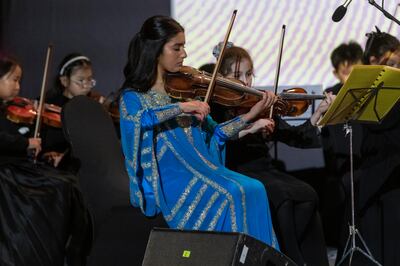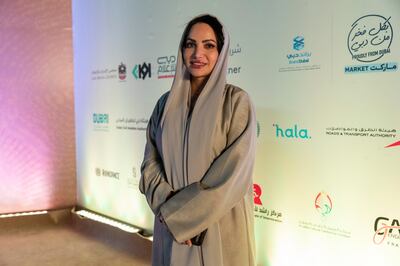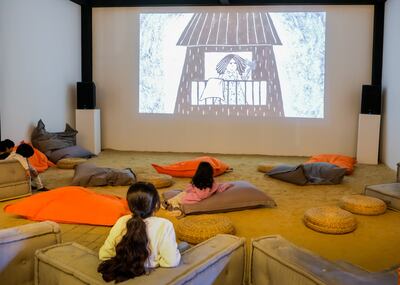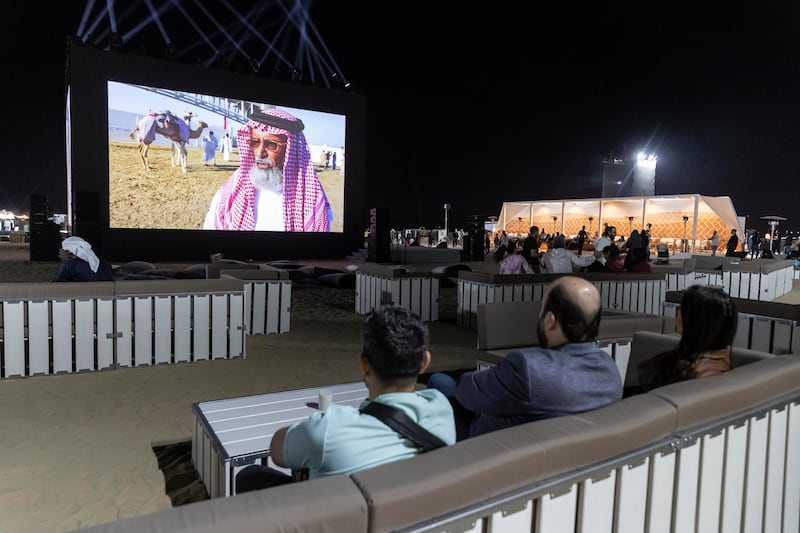In the growing landscape of regional film festivals, the one in Dubai’s desert offers something unique thanks to its venue, its celebration of Emirati heritage and its line-up of independent cinema.
Al Marmoom: Film in the Desert opened on Friday at Al Marmoom Desert Conservation Reserve with a degree of pomp that didn’t seem so out of place in the sandy venue. The event was inaugurated with a performance by the Emirates Youth Symphony Orchestra and even had a special visit from Sheikh Mohammed bin Rashid, Vice President of the UAE and Ruler of Dubai.
Now in its third year, the event, organised by Dubai Culture and Arts Authority, is running for 10 days until January 21. It was the success of the first two iterations that led to its expansion, Moza Al Falasi, the festival’s project manager, says.
“The first year the festival was just getting started,” Al Falasi says. "Last year, it had gained traction and by the end of it, many were saying three days weren’t enough so we decided to expand it.
“Filmmakers also wanted to have more screening opportunities, so we decided to extend it to 10 days.”

Speaking of the festival’s venue, Al Falasi says the event encapsulates the UAE’s love for its natural landscape as well as its championing of culture.
“Dubai also strives to be unique and a trailblazer in its initiatives,” she says. “We are a people that love the desert, especially during these months. This is a great opportunity to build a platform within the desert that merges modernity and tradition.”
This harmony is embodied in the booths that encircle the venue’s main stage. There are sections dedicated to handicrafts, including Al Talli and Al Khoos. Traditional foods such as lugaimat and rigag are served alongside contemporary favourites such as doughnuts and matcha lattes. The event also has a children's area, as well as spaces for talks and workshops, which will cover several pillars of filmmaking, from special effects and make-up to scriptwriting, directing and the process of filming in Dubai.
The centre area, meanwhile, has been fitted with a cube structure with screens on each side, ensuring that despite the many activities around the venue, the films remain at the heart of the event.

The festival is screening more than 70 regional and international titles, with many competing in Al Marmoom Short-Film Competition across animation, documentary and live-action categories.
Al Falasi says a committee of experts selected the works that will be screened, considering their quality, subject matter and how well they responded to the festival’s theme: Stories at One with Nature.
“The films come from across the Gulf, the Arab world and a few foreign countries,” Al Falasi says. “We hope to expand the list of participating countries every year.” She also noted that winning films will be revealed on January 21 during the closing ceremony.
Nahla Al Fahad, whose works include The Tainted Veil and 218: Behind the Wall of Silence, is among the judging panel in the documentary section. It is the second time the Emirati director is taking part in the festival, having been part of the judging panel last year.
“Judging has its own set of rules and expectations,” she says. “We look at the central idea of the works, the artistry of its directing, sound design, music and how it all comes together as a whole.
"There are several impressive titles this year, with more than 20 competing in the documentary section.”

Al Fahad says the festival further establishes Dubai’s position as a cultural production hub in the region.
“The emirate, since 2004 with the launch of Dubai International Film Festival, has garnered success in positioning itself in the regional and international film industry,” she says.
“The festival encouraged other events like it to take form. Al Marmoom continues on that momentum and encourages film production and emerging creatives. The festival is also unique in its venue. We have a beautiful natural landscape. Unlike other festivals, which take place in halls and along red carpets, Al Marmoom has its own flavour.”
With most of the festivals within the UAE having been cancelled, Al Marmoom: Film in the Desert provides a much-needed platform for aspiring creatives in the country to glean insights on the craft of filmmaking, Saeed Al Janahi, director of operations at Dubai Film and TV Commission, says.
“This is a chance for the youth to take part in workshops and events that will sharpen their skillsets,” he says.
"The UAE is a country that has gone from the desert to space. We have returned to the desert to practise our creativity.
"Film festivals are usually in hotel halls, and here we are in the open-air hall of the desert. It has been designed with families in mind, as well as emerging creatives. It is truly a festival that is open to all.”
The festival runs until January 21. More information is available at dubaiculture.gov.ae







